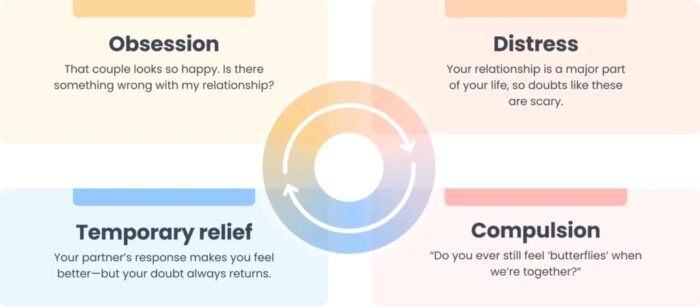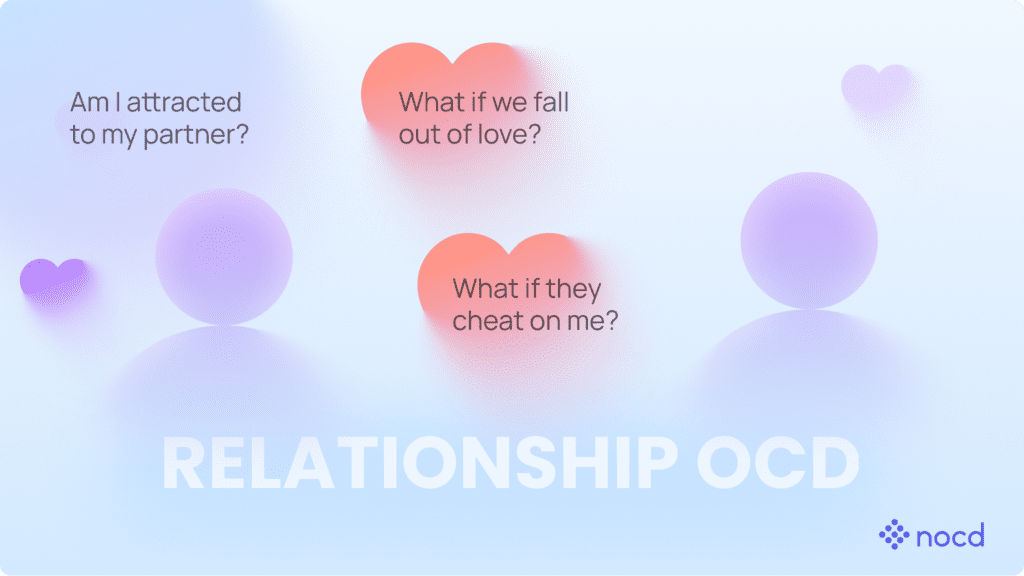Relationship OCD (ROCD) is a subtype of obsessive-compulsive disorder (OCD) where a person experiences intrusive doubts and fears about their romantic—and sometimes platonic and familial—relationships. These unwanted thoughts often focus on questions like, “Do I really love my partner?” or “Is this the right relationship for me?”
OCD affects about 1-3% of the general population, and research shows that relationship OCD is common, with over 50% of people identifying with this subtype.
What is relationship OCD?
Relationship OCD (ROCD) is a form of obsessive-compulsive disorder in which a person experiences recurring, obsessive thoughts about their relationships. These thoughts might target romantic partners, friends, family members, and even pets. Despite how real the fears feel, they are driven by OCD—not by an actual problem in the relationship.
People with ROCD often feel compelled to analyze or “test” their feelings, their partner’s behavior, or the relationship’s quality to get absolute certainty. This constant doubt can become exhausting over time, leaving both partners confused and frustrated.
ROCD isn’t about being unsure of a relationship in a normal way—it’s about being unable to tolerate uncertainty, even when nothing is wrong.
Relationship OCD (ROCD) symptoms
ROCD—and any theme of OCD—is characterized by two main symptoms: obsessions and compulsions.
Obsessions are intrusive thoughts, images, urges, feelings, or sensations that cause intense anxiety. Compulsions are mental or physical acts done to relieve that anxiety or prevent a feared outcome.
Here’s a look at some common ROCD symptoms:
Common relationship OCD obsessions
- What if we fall out of love?
- What if they cheat on me?
- Am I still attracted to my partner?
- That other couple seems so happy. Is something wrong with us?
Common compulsions in relationship OCD
- Repetitively taking relationship quizzes online.
- Checking for “signs” that you’re attracted to your partner, or vice versa.
- Repeatedly asking your partner for reassurance that they love you.
- Avoiding certain relationship milestones to protect yourself from getting hurt.
Compulsions only provide temporary relief, and when that fades, the obsessions return, and you’re right back in what’s called the OCD cycle.

What causes relationship OCD?
There is no single cause of relationship OCD or any other subtype. Instead, it’s believed to develop through a combination of genetic, biological, and environmental factors.
Because OCD often targets a person’s core values and fears, their intrusive thoughts and compulsions may center around what matters most to them, such as their relationships.
How does ROCD affect relationships?
ROCD can make the most loving and secure relationships feel uncertain or unsafe. Many people with ROCD may feel disconnected or emotionally numb, while others may have constant guilt or fear that their OCD has “ruined” their relationship.
These worries can lead to real-world consequences, such as:
- Frequent arguments or breakups caused by reassurance-seeking.
- Avoidance of intimacy or emotional closeness.
- Excessive guilt or over-apologizing to a partner.
- Feeling like you’re “faking” love or commitment.
- Difficulty enjoying positive moments because of intrusive doubt.
ROCD doesn’t just affect romantic partners—it can also impede friendships and family relationships. You might worry that you’re a “bad friend” or that you’re not close enough to your family as other people are.
How is relationship OCD diagnosed?
ROCD is not a separate diagnosis in the Diagnostic and Statistical Manual of Mental Disorders (DSM-5). Instead, it’s recognized as a presentation of OCD where the obsessions and compulsions fixate on relationships.
A licensed clinician—preferably one with specialized training in OCD—will typically diagnose ROCD based on your symptoms and how they impact your daily life. They may ask about your thoughts, feelings, and behaviors around relationships, and how often they interfere with your functioning.
If you’re unsure whether you identify with ROCD, you can take a relationship OCD test. While not a replacement for a professional evaluation and diagnosis, it can help you determine if you’re showing signs of the condition.
When to seek help for relationship OCD
You should consider seeking help for ROCD if:
- Your relationship doubts cause intense anxiety, guilt, or confusion.
- You spend hours each day analyzing or seeking reassurance.
- You’ve ended or avoided relationships due to fear or uncertainty.
- The distress interferes with your ability to connect or function.
Early treatment with an OCD specialist can help you break the cycle while also preventing further strain on your relationships.
How relationship OCD is treated
The most effective treatment for relationship OCD is exposure and response prevention (ERP) therapy. ERP is a specialized form of cognitive behavioral therapy (CBT) proven to be effective for OCD. General CBT, if not tailored for OCD, can sometimes be unhelpful or even worsen symptoms.
In ERP, you’ll gradually and carefully expose yourself to feared situations or thoughts—like reading a romantic text without analyzing it or watching a love story without comparing your relationship. Over time, your brain learns to tolerate uncertainty and discomfort without resorting to compulsions.
Here are some examples of potential ROCD exposures:
- Writing a list of doubts about your partner and reading it without reassurance.
- Looking at photos of couples without comparing.
- Saying “I might not know if this is the perfect relationship” and allowing uncertainty to exist.
Studies show that ERP therapy is highly effective, with 80% of people with OCD experiencing a significant reduction in their symptoms.
Alongside ERP, some people benefit from medication (typically SSRIs), mindfulness strategies, or acceptance and commitment therapy (ACT) to help manage anxiety.
Practicing self-compassion is also vital in treating ROCD. Many people may blame themselves for their doubts, but remembering that OCD targets what you care about the most can help you respond to your thoughts with understanding rather than judgment.
Find the right OCD therapist for you
All our therapists are licensed and trained in exposure and response prevention therapy (ERP), the gold standard treatment for OCD.
Alternative relationship OCD treatments
While ERP is the first-line treatment for OCD, additional or intensive options may help if symptoms are severe or treatment-resistant.
These can include:
- Intensive outpatient programs (IOPs)
- Partial hospital programs (PHPs)
- Residential treatment centers (RTCs)
- Transcranial magnetic stimulation (TMS)
- Deep brain stimulation (DBS)
- Gamma knife radiosurgery (GKRS)
These are typically considered when standard therapy and medication haven’t provided enough relief.
FAQs about relationship OCD
Yes. Relationship OCD is a real, research-supported presentation of OCD that causes significant distress. The doubts feel real, but they stem from OCD’s intolerance of uncertainty—not from actual relationship problems.
There’s no permanent cure for any OCD subtype, including ROCD, but effective treatment can help you manage symptoms and live a fulfilling life. Many people find that ERP therapy allows them to build healthier, more secure relationships.
If your doubts feel intrusive, repetitive, and anxiety-driven—and if you engage in compulsions like reassurance-seeking or comparison—it’s likely OCD-related rather than ordinary relationship uncertainty. People with typical doubts might question compatibility occasionally, while those with ROCD feel compelled to resolve the uncertainty right away.
Bottom line
ROCD can make you question the relationships that bring meaning to your life. But with evidence-based treatment, it’s possible to break free from obsessive doubt and reconnect with those you care about most.
If you recognize these patterns, consider reaching out to a licensed OCD specialist—ideally someone trained in ERP therapy. They can help you understand what’s happening and guide you toward lasting relief.
Key takeaways
- Relationship OCD (ROCD) involves intrusive doubts and compulsions focused on relationships.
- It can affect romantic, platonic, or family relationships.
- ERP therapy is the most effective treatment, often supported by medication or mindfulness approaches.
- Self-compassion and professional support are key parts of recovery.
- With the right help, you can move beyond obsessive doubt and build genuine, fulfilling connections.

